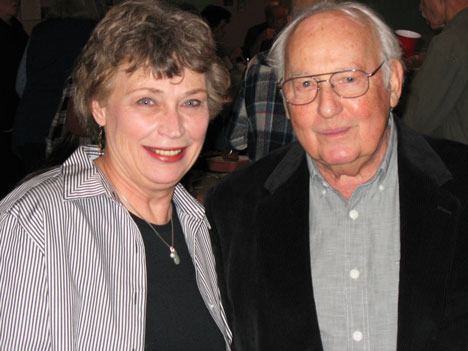Lynae Slinden is packing her bags for the Ukraine.
But it’s not a vacation. In April, Slinden arrives in the capital city of Kiev to begin a two-year commitment as a community developer for the Peace Corps.
“It’s something I’ve had in the back of my mind since 1968, but life intruded,” she said during her going-away party Sunday at Clinton Community Hall, attended by more than 80 friends and former Peace Corps volunteers.
After graduating last year from the University of Washington with a master’s degree in public administration, Slinden decided the time had come.
“I wanted to make use of the knowledge I’ve gained; this allows me to bridge the gap between education and a working career in my chosen field,” she explained. “Beyond that, you could say I’m fulfilling a long-held dream.”
She said she was given several options on countries where she might work, but told the Peace Corps she would go wherever they felt she was needed.
The Peace Corps has been a presence in the Ukraine since 1992, shortly after the country won its freedom from the former Soviet Union.
There are currently 200 volunteers working throughout the Ukraine. The country has been in the news a lot lately, following the resignation of Prime Minister Yulia Tymoshenko, who was attempting to forge closer ties with the West. She was a victim of a worsening economic situation and internal politics, and has been replaced by Viktor Yushchenko, who leans more toward Moscow.
“I don’t know exactly what that all means yet, but I’m sure I’ll be dealing with it on some level,” Slinden noted. “I do know we’re not supposed to wear orange, the color of Tymoshenko’s political party. I suspect we’ll be warned to maintain a low profile.”
The Peace Corps traces its roots and mission to 1960, when then-Sen. John F. Kennedy challenged students at the University of Michigan to serve their country in the cause of peace by living and working in developing countries.
Since that time, nearly 200,000 Peace Corps volunteers have served in 139 host countries to work on issues ranging from AIDS education to information technology and environmental preservation.
Slinden is no stranger to community service.
Before moving to Whidbey in 1987, she worked as a city planner in California. She was elected as a Port of South Whidbey commissioner in 2001 as the representative from Clinton. At the port, she led the successful drive to design and build a new day-use park next to the ferry pier at Clinton Beach, and was a strong proponent of the local arts community. She was also heavily involved in the port’s decision to acquire and operate the small-boat harbor in Langley.
Later this month, Slinden will travel to Washington, D.C. for orientation with a contingent of 75 volunteers before the long flight to Kiev. She’ll spend the first three months in group housing there, then head out to a town or village to serve as an interface between the people and various government organizations.
Volunteers are paid a living allowance on a par with what people are paid in the areas they serve.
She’s been brushing up on her language skills.
“There appears to be many English speakers in the cities, not so many in rural areas,” she said. “The first challenge is dealing with the Cyrillic alphabet, which has 33 letters versus 26. In some areas, people speak Russian, so I won’t know until I get my final assignment what specific language will be needed.”
Sunday’s party — organized by Slinden buddies Liz Arnold, Diane Kendy, Annaporne Colangelo, Nancy Robert and Elisa Miller — featured the beet-based national soup of Ukraine called borscht and a cake with the words, “We Love You, Lynae” in Ukrainian inscribed in blue-and-yellow icing (the national colors).
“The people I know who have served in the Peace Corps have wonderful memories of their adventures and experiences,” Slinden said. “Now I will too.”
During her time in the Corps, she plans to keep folks back on Whidbey Island up to date with a blog, lynaeinukraine.blogspot.com.
— Jeff VanDerford



